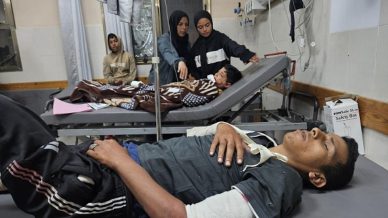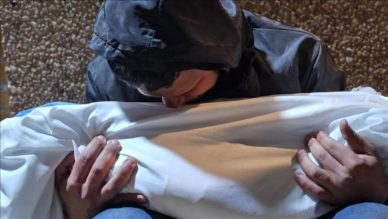GAZA, (PIC)
The ongoing bombing by the Israeli occupation army and the rise in temperatures are complicating the polio vaccination plans in the Gaza Strip, where last week the first case of polio was recorded in 25 years amid a major deterioration in health conditions.
Last Friday, the Palestinian Ministry of Health announced the registration of the first case of polio virus in the city of Deir al-Balah in the central Gaza Strip, in a 10-month-old child who did not receive a vaccination dose against the disease.
The World Health Organization (WHO) and the United Nations Children’s Fund (UNICEF) confirm that they have detailed plans to vaccinate 640,000 children across Gaza starting from the end of this month.
Juliet Touma, Director of Communications at the United Nations Relief and Works Agency for Palestine Refugees (UNRWA), tells the French news agency that “it is extremely difficult to carry out a vaccination campaign of this scale under a sky filled with air strikes.”
She also points to restrictions imposed on the entry of medicines and other aid into the besieged Strip, while the high temperatures in the summer make it more difficult to implement the vaccination campaign.
Polio virus is most often spread through contaminated water and sewage, and is highly contagious. It can cause permanent deformities and paralysis, and can be fatal. It mainly affects children under the age of five.
A fragile supply chain
WHO representative in Gaza, Richard Peeperkorn, says the organization will oversee the main plan for the vaccination campaign, with 2,700 health workers distributed across 708 teams working in every municipality in the Gaza Strip.
UNICEF, through its spokesman Jonathan Cricks, says it is responsible for ensuring the supply chain that requires cooling to bring the vaccines and distribute them throughout the Gaza Strip.
The necessary cooling equipment, including refrigerators, arrived at Tel Aviv airport last Wednesday.
Cricks says the vaccines, which were expected to start arriving at Tel Aviv airport on Thursday, were delayed and will arrive next Sunday, to enter Gaza the same day through the Karm Abu Salem crossing near the Egyptian border.
The vaccines are oral drops, not injections. About 1.6 million doses have been prepared to provide two doses for each of the 640,000 children in Gaza, with surplus doses to cover any losses due to the heat.
The UNICEF spokesperson says, “Each box contains a temperature-sensitive indicator that reacts to temperature changes and shows when the doses become unusable.”
Delivering aid and supplies through entry points controlled by the Israeli occupation authorities is a central issue for humanitarian organizations working in Gaza, which complain about the restrictions imposed by the occupation, including the constantly changing lists of permitted items and administrative obstacles that lead to delays.
As a result, shortages of everything from fuel and medical equipment to food are increasing in the Gaza Strip.
According to Toma, once the vaccines reach the Gaza Strip, they will be stored in a refrigerated space, a United Nations storage area in the central Gaza city of Deir al-Balah, before the vaccination campaign begins on August 31.
Krix explains that the vaccines “will be distributed by refrigerated trucks if we can find some, or in cooler boxes filled with ice packs,” noting that they will go to Ministry of Health facilities, UNRWA shelters and partners.
Access to children is not guaranteed
The health system in Gaza has been devastated by the ongoing war of extermination on Gaza for more than ten months.
Krix points out that only 16 out of 36 hospitals are operational in the Gaza Strip, and only partially, “and with the only power plant shut down and electricity supplies from Israel cut off, health facilities rely heavily on generators while fuel is very scarce.”
According to Krix, only 11 health facilities have been identified as capable of storing the vaccines in their refrigerators, adding that “even if the vaccines are successfully transported and distributed, there is no guarantee that people will be able to access them safely.”
UN Secretary-General Antonio Guterres called for a seven-day truce after the first polio case was revealed, in order to vaccinate children.
The director of primary health care in the Gaza Ministry of Health, Musa Abed, says, “Without a safe environment for the vaccination campaign, we will not be able to reach 95% of children under the age of ten,” the set target for the campaign.
Abed adds that many Gaza residents live in temporary camps or UNRWA schools that have become shelters, making it difficult to reach them.
Since October 7, 2023, the Israeli occupation, with absolute American support, has been waging a war of extermination on Gaza; resulting in more than 133,000 Palestinian dead and injured, mostly children and women, and more than 10,000 missing.













